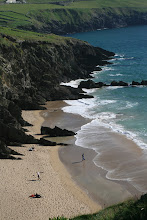 On the evening after Brooklyn's 39th and last Bloody Sunday March and Mass, two Bloody Sunday victims' brothers joined march organizers and participants for dinner and conversation.
On the evening after Brooklyn's 39th and last Bloody Sunday March and Mass, two Bloody Sunday victims' brothers joined march organizers and participants for dinner and conversation.John Kelly and Gerry Duddy had traveled from Derry to be part of the Bay Ridge Irish American Action Association's last march. After 39 years, the 14 unarmed civil rights protesters who were killed by British Army Parachute Regiment soldiers on January 30, 1972, were finally vindicated by the release of the Saville Report on June 15, 2010.
Over dinner, Kelly and Duddy, explained how the victims' families waged an unrelenting campaign to have their loved ones declared "innocent" of any wrong-doing on that Bloody Sunday. They took on the British government and won. "We were a thorn in their side," Duddy said.
Kelly, who was the elder brother of 17-year-old Michael Kelly, said that he never gave up over 38 1/2 years for his mother's sake. His brother's death was devastating for her, and sadly she died before the report was released.
Their lives were taken over by the Bloody Sunday Justice Campaign of which they were both founding members. Postcards, letters, visits to politicians, "any door that was open" kept their cause alive through the years between the Widgery Tribunal whitewash and the commencement of the Saville investigation more than 20 years later.
Duddy, whose 17-year-old brother Jackie was killed, was himself 14 years old on the day of the march. "I went this way and my brother went that way," Duddy said. If it had been the other way, and Gerry had been shot, he said, he knows his brother would have done the same for him in seeking justice.
Kelly said that on last June 15, when the families went to the Guildhall in Derry to read the final Saville Report, they had no idea what to expect. Within a few minutes, though solicitors let them know that it was good news -- the "innocent" verdict they had been seeking for years was there.
It was pure joy to look out on the thousands in the Guildhall Square when the news was shared with the world. The families looked out on the crowd and knew the news was spreading worldwide with the great press coverage there.
Kelly invited anyone who visits Derry to stop by and see him at the Free Derry Museum in the Bogside where the Bloody Sunday story is told. He said that some British visitors have come in and are appalled at what happened on January 30, 1972, and apologize to him. But he tells him, it is the government not the people who needed to apologize.
Kelly did say, though, that the families are not finished yet. They want to see the soldiers who were responsible for the murders of their unarmed relatives to be prosecuted. This has nothing to do with monetary compensation they stressed, but everything to with justice.

No comments:
Post a Comment